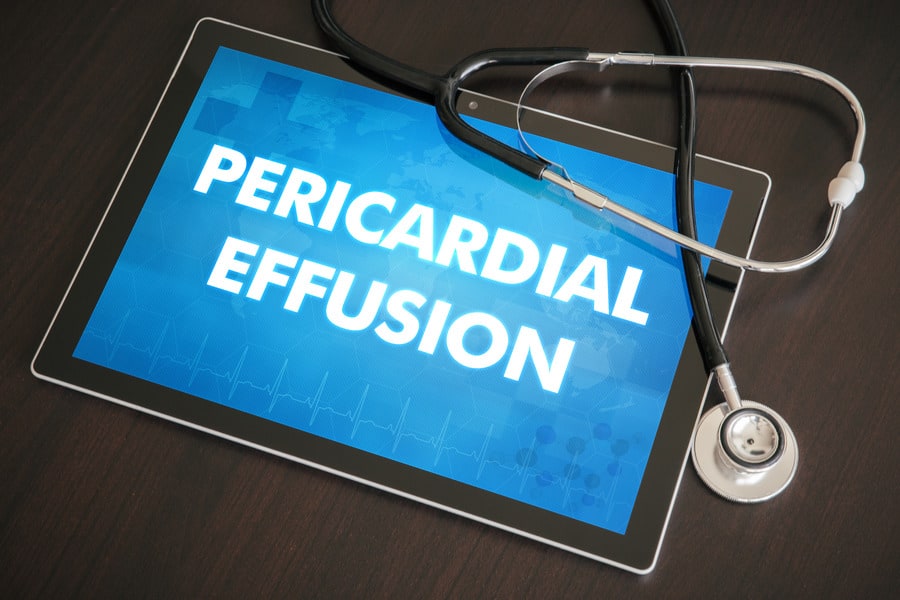Pericardial Effusion is a condition characterized by an accumulation of excess fluid within the pericardial sac, a thin, two-layered membrane that surrounds the heart. This fluid buildup can lead to increased pressure on the heart, affecting its ability to function properly.
Overview
The pericardial sac usually contains a small amount of fluid (15-50 milliliters) that serves as a lubricant, reducing friction between the heart and surrounding structures during contraction. However, various factors can cause fluid to accumulate within the sac, leading to Pericardial Effusion.
Pericardial Effusion can be acute or chronic and may be caused by various underlying conditions. In some cases, it may result in a life-threatening complication called Cardiac Tamponade, where the pressure on the heart impairs its ability to pump blood effectively.
Symptoms of Pericardial Effusion
The symptoms of Pericardial Effusion may vary depending on the size of the effusion and the speed at which it develops. Some cases of Pericardial Effusion may have no symptoms at all, particularly if the fluid accumulates slowly over time. In other cases, symptoms may appear suddenly if fluid rapidly accumulates. Here are the primary symptoms of Pericardial Effusion, explained in more detail:
- Chest Pain or Discomfort: This is often described as a sharp, stabbing pain, or a dull ache in the chest. The pain may worsen when lying down and improve when sitting up or leaning forward.
- Shortness of Breath: Fluid buildup can compress the heart and restrict its ability to fill properly, leading to reduced cardiac output and shortness of breath. This symptom may be particularly noticeable when lying down.
- Fatigue or Weakness: Reduced cardiac output can result in decreased oxygen delivery to the body, leading to fatigue and weakness.
- Rapid or Irregular Heartbeat: The pressure from fluid buildup can irritate the heart, leading to abnormal heart rhythms (arrhythmias).
- Cough: Fluid accumulation may compress the bronchial tubes or lung tissue, leading to a persistent cough.
- Swelling of the Legs or Abdomen: Reduced cardiac output may cause fluid retention and swelling in the legs and abdomen.
Causes
Pericardial Effusion can result from various causes, including:
- Inflammation: Pericarditis, inflammation of the pericardium, is a common cause of Pericardial Effusion.
- Infections: Viral, bacterial, fungal, or parasitic infections can lead to fluid accumulation.
- Autoimmune Disorders: Conditions such as lupus or rheumatoid arthritis can cause Pericardial Effusion.
- Heart Surgery or Trauma: Injury to the heart or pericardium, including heart surgery, can result in fluid buildup.
- Cancer: Tumors near the heart or metastatic cancer can cause Pericardial Effusion.
- Kidney Failure: Uremia, a buildup of waste products in the blood, can lead to inflammation and fluid accumulation.
- Hypothyroidism: Low thyroid hormone levels can cause Pericardial Effusion.
- Medications: Some drugs, such as hydralazine or isoniazid, can cause fluid buildup.
Risk Factors for Pericardial Effusion
Pericardial Effusion can occur in people of all ages and backgrounds. However, certain factors may increase the risk of developing this condition:
- History of Pericarditis: Previous inflammation of the pericardium (pericarditis) increases the risk of fluid buildup.
- Autoimmune Disorders: Conditions such as lupus, rheumatoid arthritis, and scleroderma can cause inflammation and fluid accumulation around the heart.
- Recent Heart Surgery or Trauma: Injury to the heart or pericardium, including surgeries like coronary artery bypass grafting, can result in Pericardial Effusion.
- Cancer: Tumors near the heart, including lung or breast cancer, as well as metastatic cancer (cancer that has spread from its original location), can cause fluid accumulation. Lymphoma and leukemia are also associated with Pericardial Effusion.
- Kidney Failure: Uremia (buildup of waste products in the blood) due to kidney failure can lead to inflammation of the pericardium and subsequent fluid accumulation.
- Hypothyroidism: Low levels of thyroid hormone can lead to Pericardial Effusion. Hypothyroidism may cause fluid retention and increased blood volume, which can increase the risk of fluid accumulating around the heart.
- Certain Medications: Some drugs, such as hydralazine (used to treat high blood pressure) or isoniazid (used to treat tuberculosis), can increase the risk of developing Pericardial Effusion.
- Viral Infections: Infections caused by viruses such as Coxsackievirus, Echovirus, or the virus that causes HIV/AIDS can lead to Pericardial Effusion.
How to Avoid It
Preventing Pericardial Effusion involves managing the underlying causes and risk factors:
- Manage Chronic Conditions: Regularly monitor and manage conditions such as kidney failure or hypothyroidism.
- Treat Infections: Promptly treat infections that can lead to Pericardial Effusion.
- Follow Medication Guidelines: Use medications as prescribed and discuss any potential side effects with your healthcare provider.
When to See the Doctor
Seek medical attention if you experience symptoms of Pericardial Effusion, such as chest pain or shortness of breath. Early diagnosis and treatment are essential to prevent complications.
Treatment
Treatment for Pericardial Effusion depends on the underlying cause, the amount of fluid, and any associated symptoms or complications:
- Monitoring: Small, asymptomatic effusions may require regular monitoring.
- Medications: Anti-inflammatory drugs or diuretics may be prescribed to reduce inflammation or fluid buildup.
- Pericardiocentesis: A procedure to remove excess fluid from the pericardial sac.
- Pericardiectomy: Surgery to remove part or all of the pericardium, typically reserved for recurrent or chronic effusions.
- Treat Underlying Causes: Addressing the underlying causes, such as infections or autoimmune disorders, is essential.
In conclusion, Pericardial Effusion, a condition characterized by excess fluid around the heart, can result from various causes and may lead to complications like Cardiac Tamponade. Prompt diagnosis and appropriate treatment are crucial to prevent adverse outcomes and improve heart function.









